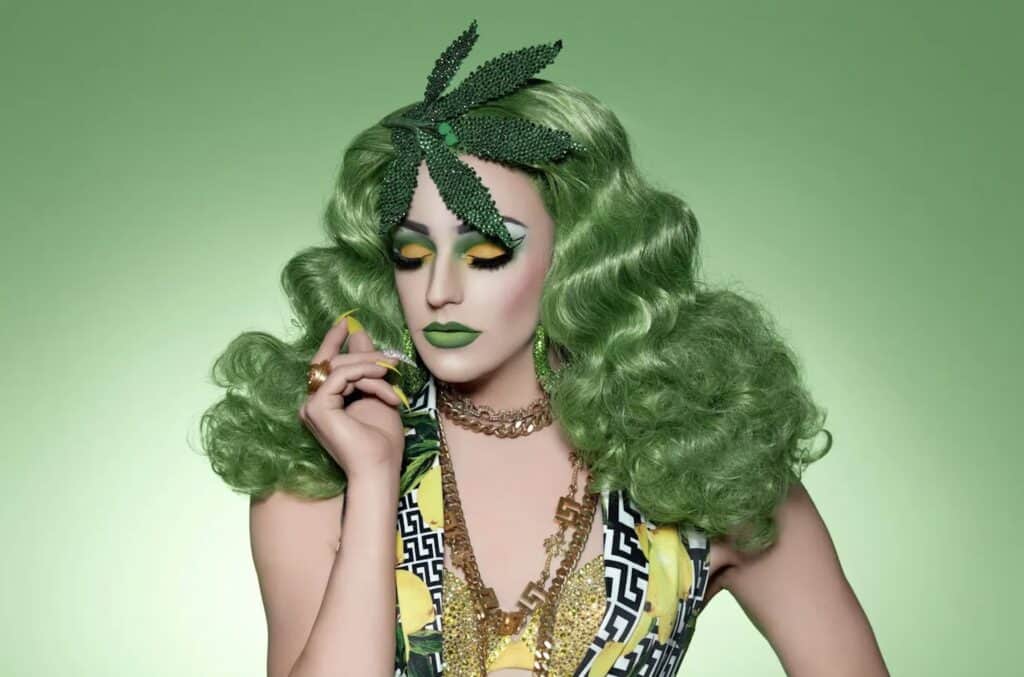
|Cannabis researcher in nightshift checking cannabis flower in lab farm greenhouse. Cannabis farming control environment for medical industry. selective focus|Lesbian couple relaxing at home.|Chris Wakefield and KaliMa Amilak both smiling | Image courtesy of Queer in Oakland|||
Learn more about 420 and trans-owned cannabis brands that are making moves in the world of THC, CBD, and Hemp.
By Daniela “Dani” Capistrano and Oliver Whitney
Cannabis is an incredible gift for so many reasons—and you don’t have to get high to tap into the blessings. On 4/20 and beyond, cannabis can offer an array of benefits from managing pain and physical ailments to helping with sleep disorders, from supporting creativity to providing mental health relief. Check out our trans-affirming guide to cannabis below and have a great 420!
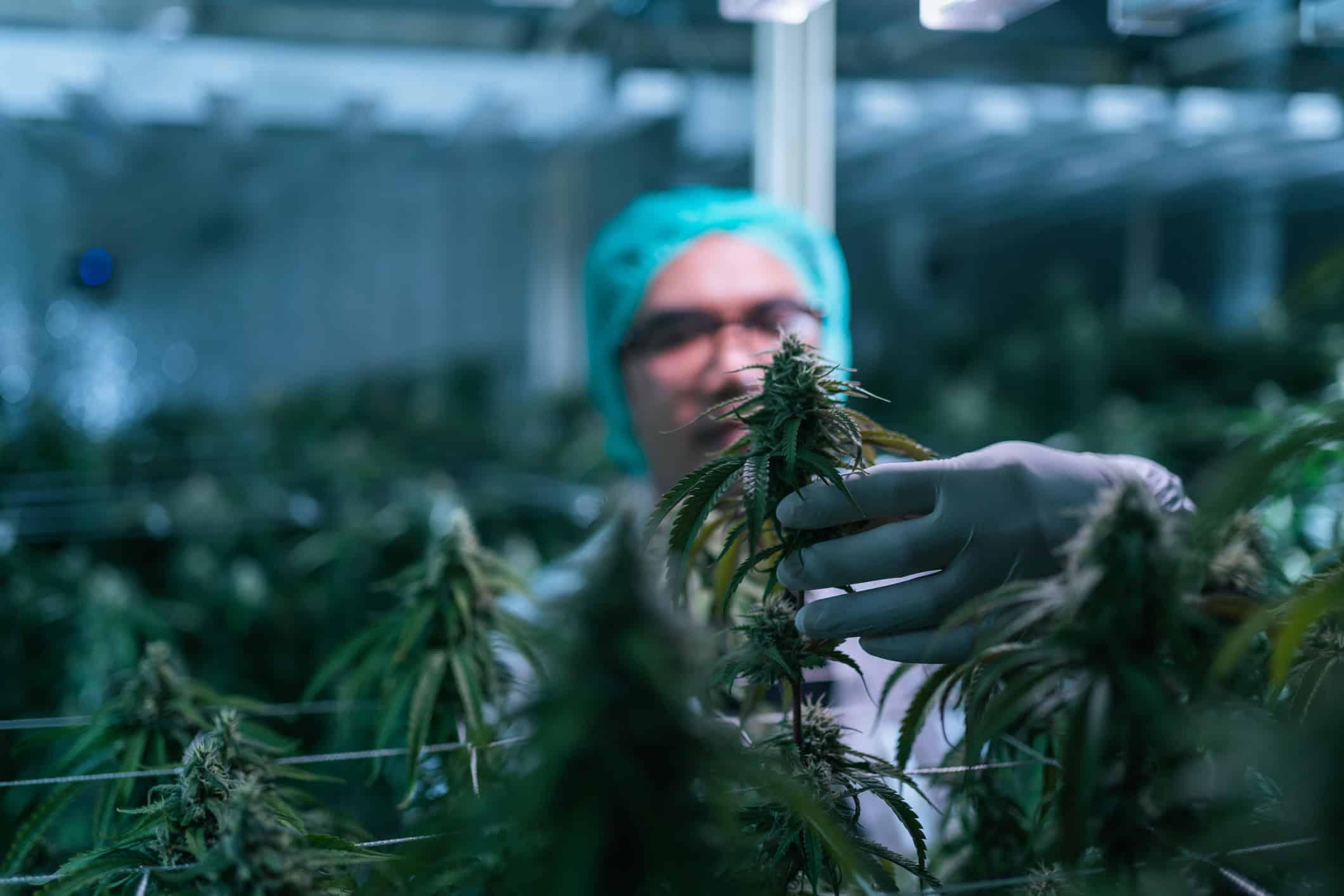
420: What You Need to Know
In 1971, five teens in San Rafael, California, used the term “4:20” while coming up with a plan to find an abandoned cannabis crop, based on a treasure map made by the grower. High Times popularized the story of the Waldos and the term eventually reached the mainstream through Grateful Dead followers after a roadie named Reddix called for 4:20 pm to be the socially accepted time of the day to consume cannabis.
Cannabis Action Network, a reform organization associated with High Times, is often credited for associating the date April 20 and 420 with political and cultural protest, organizing rallies on that date and assisting other groups in setting up other events. Since then, April 20 has become an international counter-culture holiday based on the celebration and consumption of cannabis.
Vivian McPeak, a founder of Seattle’s Hempfest, states that 4/20 is “half celebration and half call to action.”
Some people assume that hemp and marijuana are two different species of plant, with marijuana being the black sheep of the two, but that’s not the case! They’re actually just two different names for cannabis, a type of flowering plant from the Cannabaceae family.
As explained on healthline.com, while science doesn’t differentiate between “hemp” and “marijuana,” the law does: legally, the key difference between the two is tetrahydrocannabinol (THC) content.
THC is one of the many cannabinoids (chemicals) found in the cannabis plant. It’s also the one that’s primarily responsible for the “high” associated with cannabis, but you don’t need to get high to enjoy the benefits of cannabis! Folks should use discernment about how and when to incorporate the cannabis plant into their lives.
Cannabis Glossary
Cannabis can be especially beneficial for the trans community, considering the immense difficulties and structural barriers trans people face.
We should leverage all of nature’s blessings on our healing journeys, plus sober babes can still benefit from cannabis’ diverse range of healthy offerings.
Here is a mini cannabis glossary to get you started:
Hemp: a term used to define cannabis that contains 0.3 percent or less of THC content by dry weight. This definition was first proposed in 1979, in a book called “The Species Problem in Cannabis: Science & Semantics.” This number was used in the legal definition of hemp, as specified in the Agricultural Act of 2018 and other laws in the United States.
People don’t typically get high ingesting or smoking hemp on 420 or any other day, because the THC level in hemp is so low.
Hemp has so many wonderful applications to help make the world a better place; it is often used to create environmentally-friendly products such as rope, plastics, paper, building materials, biofuel, consumer goods like backpacks, textiles / clothing, laundry detergent, beauty supplies, pet products, food products, and more.
Hemp essential oils are even used therapeutically to address medical conditions such as sleep disorders, chronic pain, various inflammatory and autoimmune diseases, and for other wellness plan needs.
Marijuana: the type of cannabis that can get you kind of high or very high, depending on the strain and your tolerance. This term is often used interchangeably with “weed” and other slang terms. Legally, “marijuana” is defined as cannabis that has more than 0.3 percent THC by dry weight & THC content can vary among cannabis plants, as many TV shows and movies have creatively illustrated.
Currently in the United States, the forms of cannabis that get you high are legal in 38 of 50 states for medical use and in 24 states for recreational use.
But be careful: marijuana is still illegal under federal law, but most folks in the USA now live in a state that has legalized it, and most also have at least one cannabis dispensary in their county.
Cannabis plants that get you high have been designated usually as sativa (generally uplifting), indica (induce sleepiness), or hybrid (mixed bag). There is a lot of anecdotal evidence that each of these has its own reported characteristics and effects, although science has yet to officially verify this. Okay, science.
Cannabidiol (CBD): many an elder millennial with back pain can attest to the medicinal (without getting you high) benefits of CBD, which has become increasingly popular since hemp was federally legalized in 2018. While CBD is found in some amount in all cannabis plants, CBD products are only federally legal if they’re derived from hemp that contains less than 0.3 percent THC.
Some examples of CBD edible/ingestible products include oils that many people claim reduce inflammation and physical aches, along with gummies and tablets to address anxiety and overall mood. You can also use CBD topically: as oils, lotions, roll-ons, and more to support a range of medical needs.
Cannabis Industry: we’re talking about an old & profitable plant! Cannabis has been around since over 12,000 years ago. Today the cannabis industry is composed of legal cultivators and producers, consumers, independent industrial standards bodies, related products and services, regulators and researchers devoted to understanding and monetizing cannabis and its industrial derivative, hemp.
Unfortunately, the cannabis industry’s mellow has been harshed by regulatory restrictions for most of history, and in the USA, cannabis remains illegal on the federal level. But the legal market worldwide has emerged rapidly as more governments legalize medical and adult use.
Internationally, Uruguay became the first country to legalize recreational marijuana through legislation in December, 2013. Canada followed suit, becoming the first country to legalize private sales of recreational marijuana with Bill C-45 in 2018.
Back in the United States, today recreational use of marijuana is legal in 23 states and Washington, D.C. Additionally, in 37 states, medicinal use of marijuana is legal for specific patients.
Marijuana laws in the USA have changed a lot the last few decades and will likely continue to do so, so it’s important to remain aware of the risks of consuming cannabis on a state-by-state basis.
The United States’s relationship with marijuana dates back to the Colonial Era. However, during World War II, imports of hemp and other materials became crucial for producing marine cordage, parachutes, and other military necessities became scarce. This is when the cannabis industry had one of its bigger historical moments in the sun.
In response to the World War II need, the U.S. Department of Agriculture launched its “Hemp for Victory” program, encouraging farmers to plant hemp by giving out seeds and granting draft deferments to those who would stay home and grow hemp. By 1943 American farmers registered in the program harvested 375,000 acres of hemp.
After a lot of racism-fueled nonsense, the US Agricultural Act of 2014, known as the Farm Bill, allowed hemp production under pilot projects administered by state departments of agriculture and executed by state universities. In 2018 hemp was further defined as an agricultural commodity and removed from the controlled substances list.
This slow progress eventually created a pathway for the commercialization of cannabis/hemp production, which has led to the progressive evolution of what cannabis is today: an almost $40B industry in 2024. That’s a lot of flower and over 400,000 cannabis industry jobs!
420 Tea: How Does Cannabis Benefit Trans Folks?

While everyone has their own relationship to the plant, many TGNC folks have been vocal about the benefits of cannabis; from helping to reduce gender dysphoria, PTSD symptoms, cultivating body positivity, and even enhancing our sex lives.
Activist and actress Blossom Brown has also written about marijuana’s benefits for trans folks and noted how the community is a major customer base of the industry.
Support Trans People on 420
According to Gallup, half (50%) of Americans say they have tried marijuana at some time. For those of us who use THC, CBD, and hemp products, why not put $5 (or more) on trans cannabis-based businesses? 420 is a great day to support trans folks in cannabis!
The above video features Renee Gagnon, a transgender woman and founder of HollyWeed, a cannabis brand based in California. She’s a pioneer and one of several out trans people who have been grinding in the cannabis industry.
Beyond Renee, let’s give more trans folks their flower(s): below is a list of 5 TGNC people who are making moves and opened doors for TGNC folks in the cannabis industry. From a Black, nonbinary-owned wellness company that supports its local Oakland community to a CBD brand co-founded by a Texas trans man, we hope you’ll find what you’ve been looking for!
Chris Wakefield and KaliMa Amilak of Brown Sugar Botanicals
Brown Sugar Botanicals is a Black, queer, trans, and nonbinary-owned company with herbal and CBD products based in Oakland, California. Founded by Chris Wakefield and KaliMa Amilak, two Black, queer, and non-binary entrepreneurs, Brown Sugar Botanicals specializes in “disaporic healing for modern lifestyles.”
What that means for Wakefield and Amilak is approaching holistic wellness in the CBD arena with a deep awareness of the ways “people of the African diaspora are disproportionately affected by healthcare disparities and discrimination,” per an Instagram post. The online brand is all about putting ethics over profit and building wealth for the local Oakland community. Wakefield and Amilak achieve that by doing what few other CBD wellness brands do — intentionally sourcing their products from Black, brown, queer, and trans growers.
Brown Sugar Botanicals’ online shop is currently under construction, but you can follow them on Instagram for updates. Don’t miss their informational IG posts about the benefits of CBD for a variety of things like Fibromyalgia, mental health, and COVID.
Zooey Zachow of Ritual Cannabis
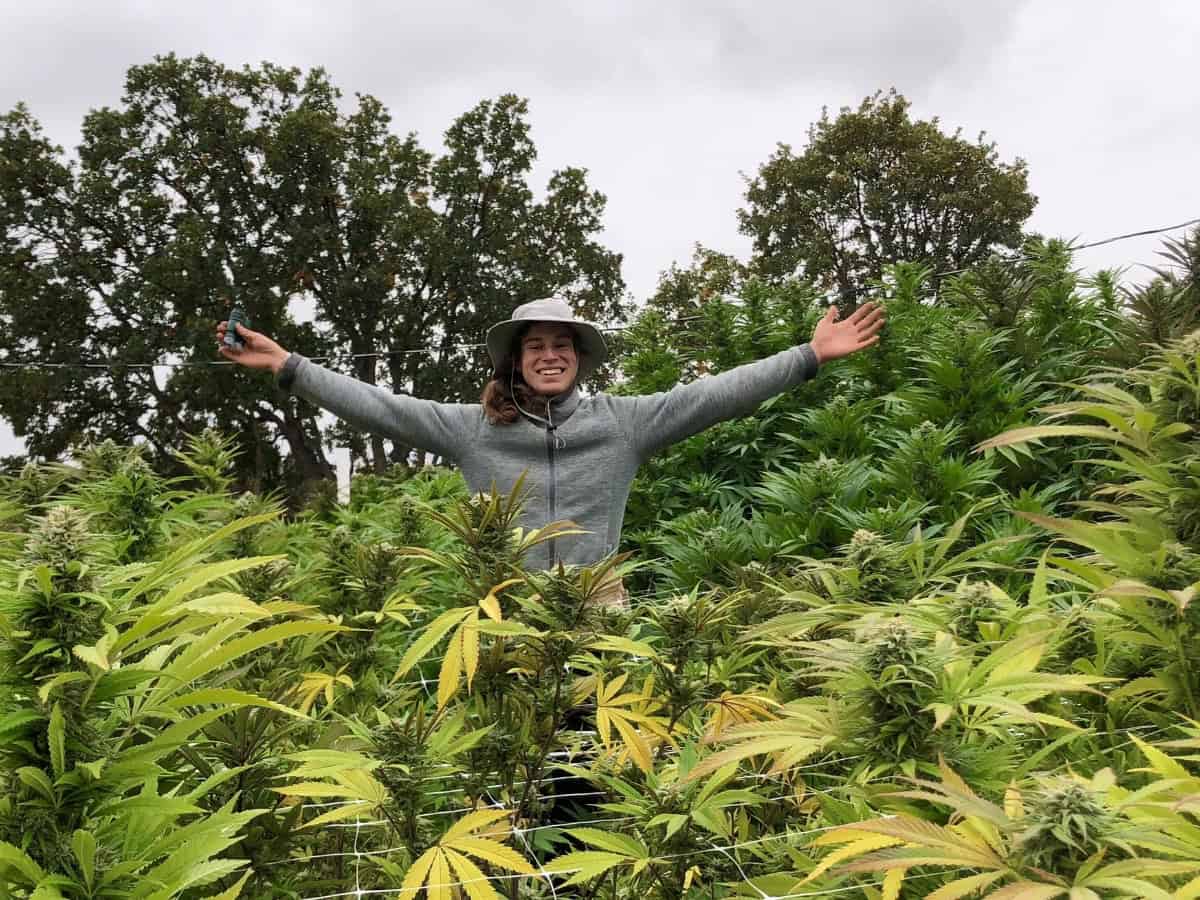
Ritual Cannabis, a farm located in Windham County, Vermont, was co-founded by CEO Zooey Zachow. A trans woman and U.S. Army veteran, Zachow suffered from a neck injury and PTSD after returning from Iraq. Upon learning about how cannabis helped other vets manage their pain and symptoms, Zachow gave it a try. Weed, she told VICE back in 2016, saved her life. It also completely changed the course of her career. Zachow became a cannabis entrepreneur, opening up her first medical cannabis collective in 2011, according to Cannabis Now, and then finally started her farm, Ritual Cannabis. Initially based in eastern Washington, Zachow’s farm recently relocated to the forests of Vermont with a focus on using “natural, organic, and biodynamic practices.”
“Being a trans woman in the cannabis industry has been profoundly difficult and exhausting,” Zachow told grower magazine Big Buds in 2019. “At the same time, I know this industry is one of the few I would have the opportunity to be a leader in.”
While Ritual Cannabis doesn’t currently have a website, you can check out their Instagram for updates on sprouting cannabis seedlings across the farm.
Jordyn Pollack of Ziggy’s Naturals
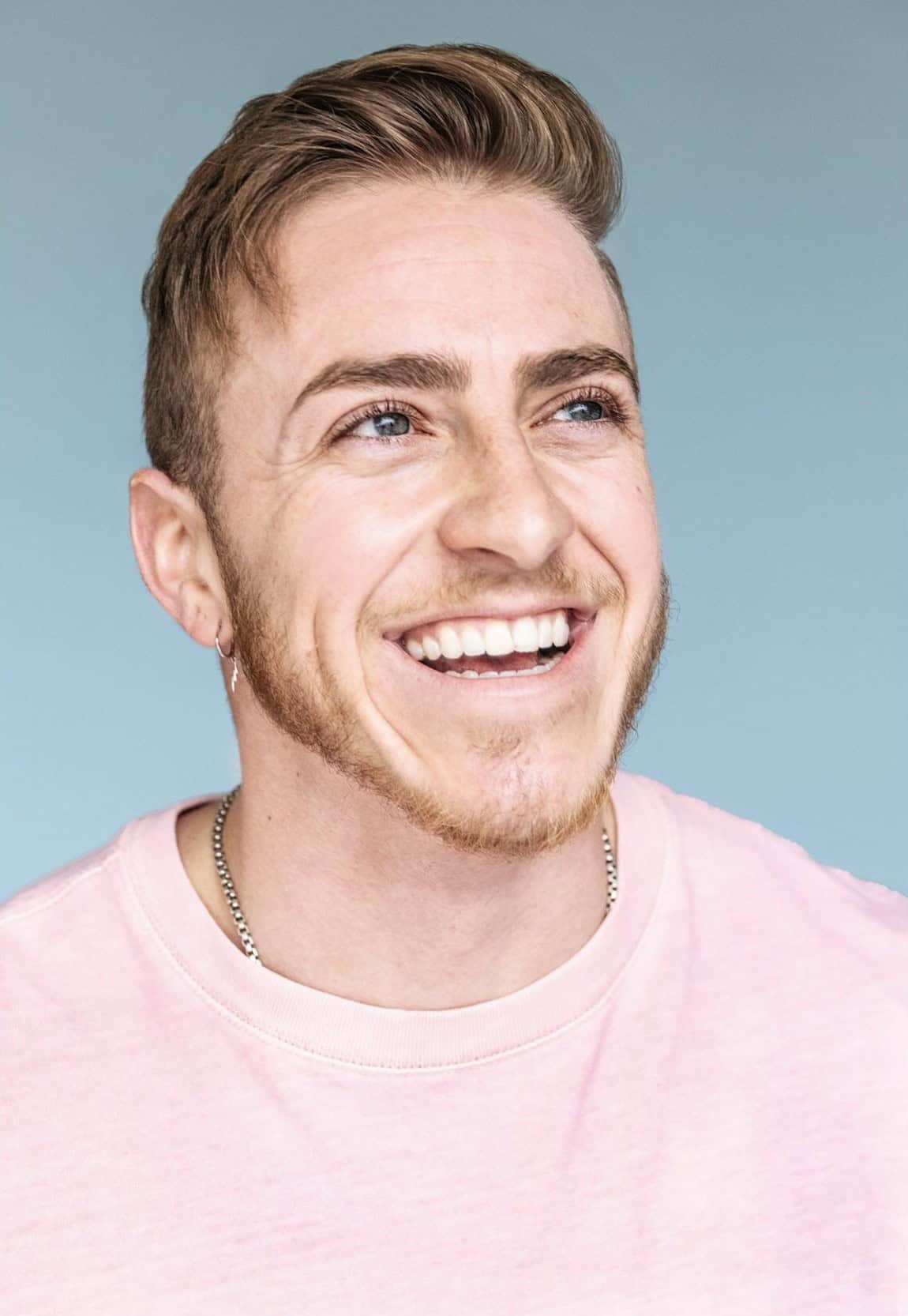
Entrepreneur, social influencer, and trans man Jordyn Pollack is one of the co-founders of his family-owned CBD brand, Ziggy’s Naturals. The entire company is a true family affair, as Pollack started it with his father Marc and brother Jake, and even named the brand after his wife, Ziggy. Based in Austin, Texas, the brand specializes in purely organic, Full Spectrum CBD products such as CBD tinctures, gummies, muscle gels, and salves. On top of that they also offer a variety of Delta-9 products and pet-safe CBD tinctures.
In an interview with Collabs.io Pollack said Ziggy’s, which largely caters to an LGBTQ+ customer base, represents more than a CBD company. “We stand for family, love, and pride for all,” he said. “We like to show the community that we are here to support them in all ways we can, by hosting events, raising money, and many more things.”
Check out Ziggy’s Naturals’ Instagram for recipe posts, like a mocktail using their Delta-9 syrup, and head to the online shop for a current sale on a CBD topical gift box.
Laganja Estranja, the ‘Queen of Weed’
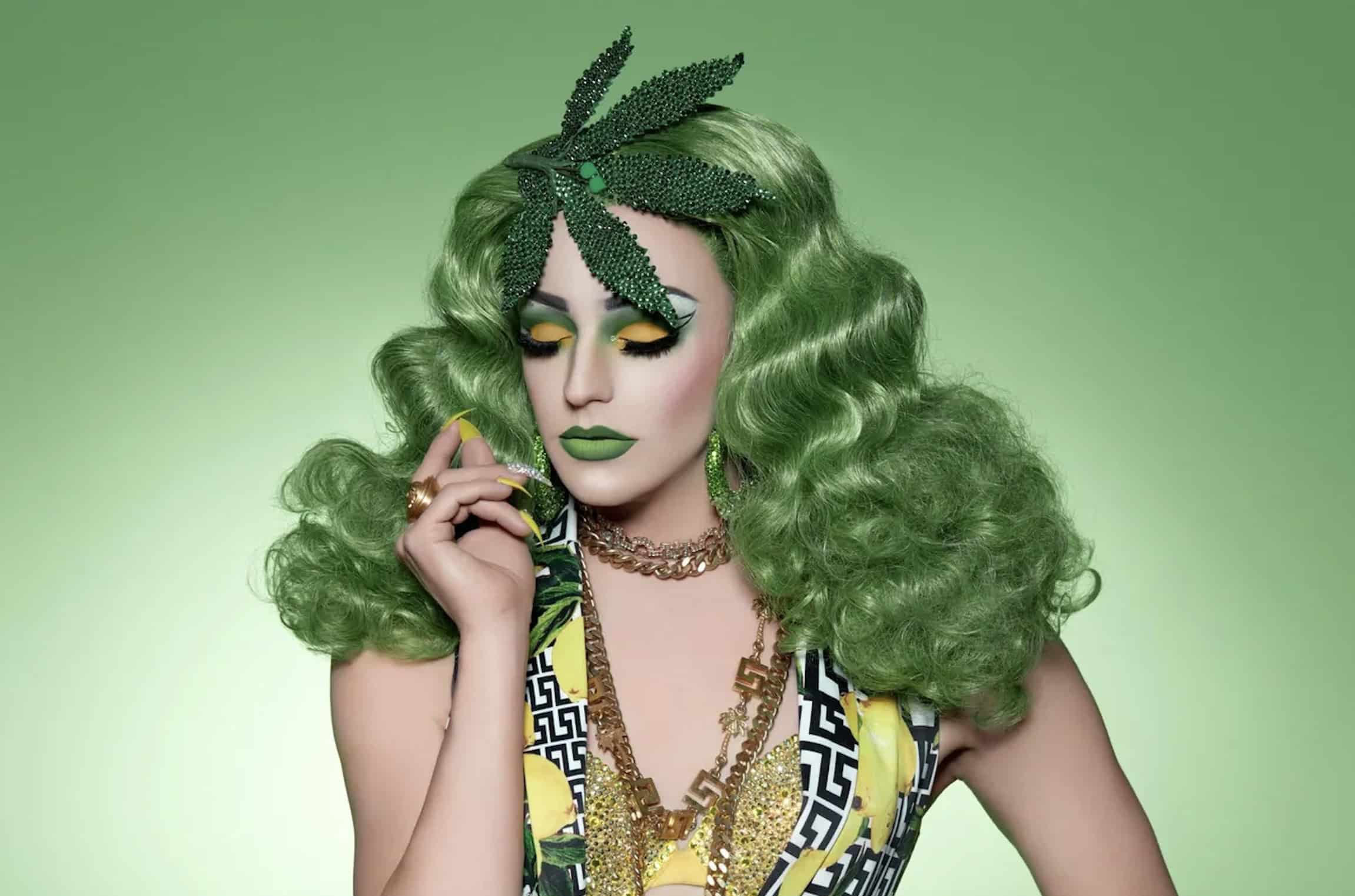
While the trans drag artist may be known to most as a Drag Race alum, Laganja Estranja is also celebrated for her love of weed and cannabis advocacy. The plant itself has informed everything from her name to her green-infused, mary jane-centric drag looks. She’s even teamed up with multiple brands to launch 420 products, including a skin care line of hemp CBD-infused potions with Honey Pot CBD.
Laganja Estranja has notably been vocal about her personal experience with cannabis, sharing the ways it’s improved her mental health and even how her relationship with weed changed when she started HRT. The drag performer has also spoken about the importance of decriminalization and the need to give back to Black and brown folks who are disproportionately arrested and incarcerated for cannabis possession. “There’s a lot more work to do,” she told PinkNews in 2021, “because we need to free our brothers and sisters — particularly those of color — from jail, and create more space within cannabis activism for queer and gender non-conforming people to feel safe.”
Check out her YouTube channel for her latest cannabis brand partnerships and a new music video dropping on, fittingly, 4/20.
420 Racism: The Intersection of Blackness and Transness
When we talk about 420, it’s important to remember that there is enormous privilege involved in being able to walk around in public lighting up a joint, unafraid of police violence or arrest.
Trans people don’t share the exact same privileges and experiences with systems of oppression, and Black trans people in America have been disproportionally arrested and incarcerated for possessing, distributing, and selling cannabis when compared to white cisgender people.
A nug of history: in 1971, President Richard Nixon declared a “war on drugs” that was essentially a targeted war on Black communities.
The 50+ year “war on drugs” has imprisoned millions of Black people in United States.
Many Black trans and cis people remain incarcerated for doing things with cannabis products that white entrepreneurs are getting VC funding and media accolades for today. The cannabis industry should center Black trans people to ensure an equitable industry for all.
Regardless of how you choose to purchase and use cannabis, consider ways to support Black trans and cis people in cannabis; allyship takes many forms. Happy 420!
Did you find this resource helpful? Consider supporting TransLash today with a tax-deductible donation. Did we miss anything? Let us know!